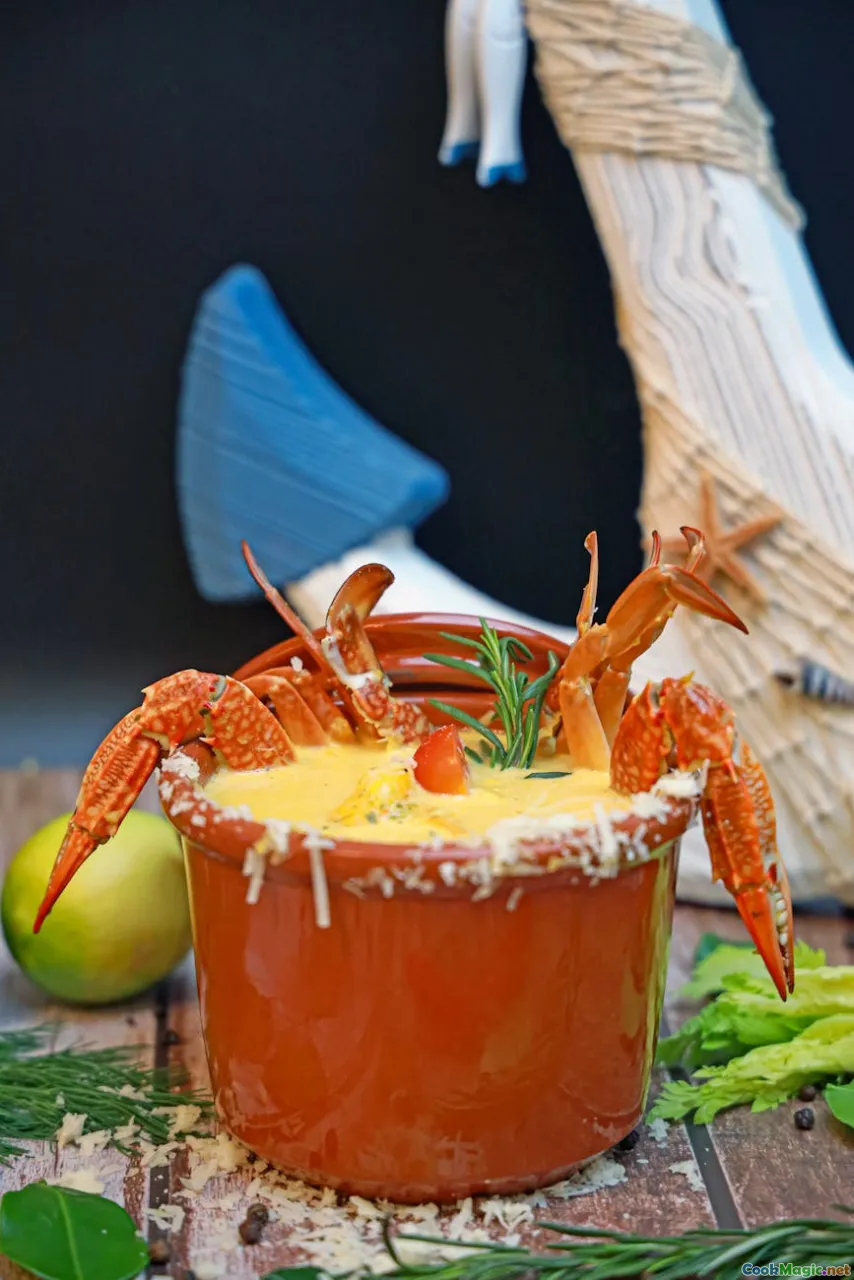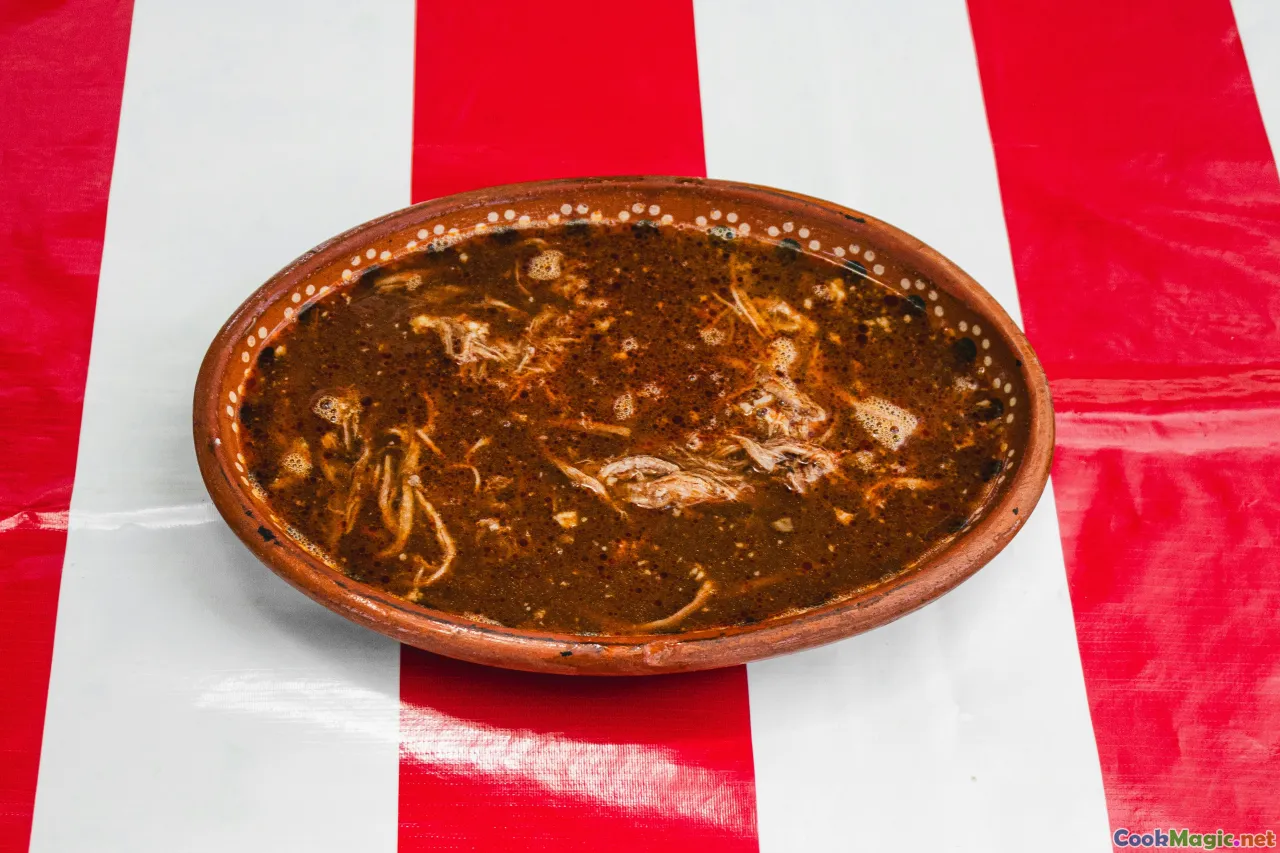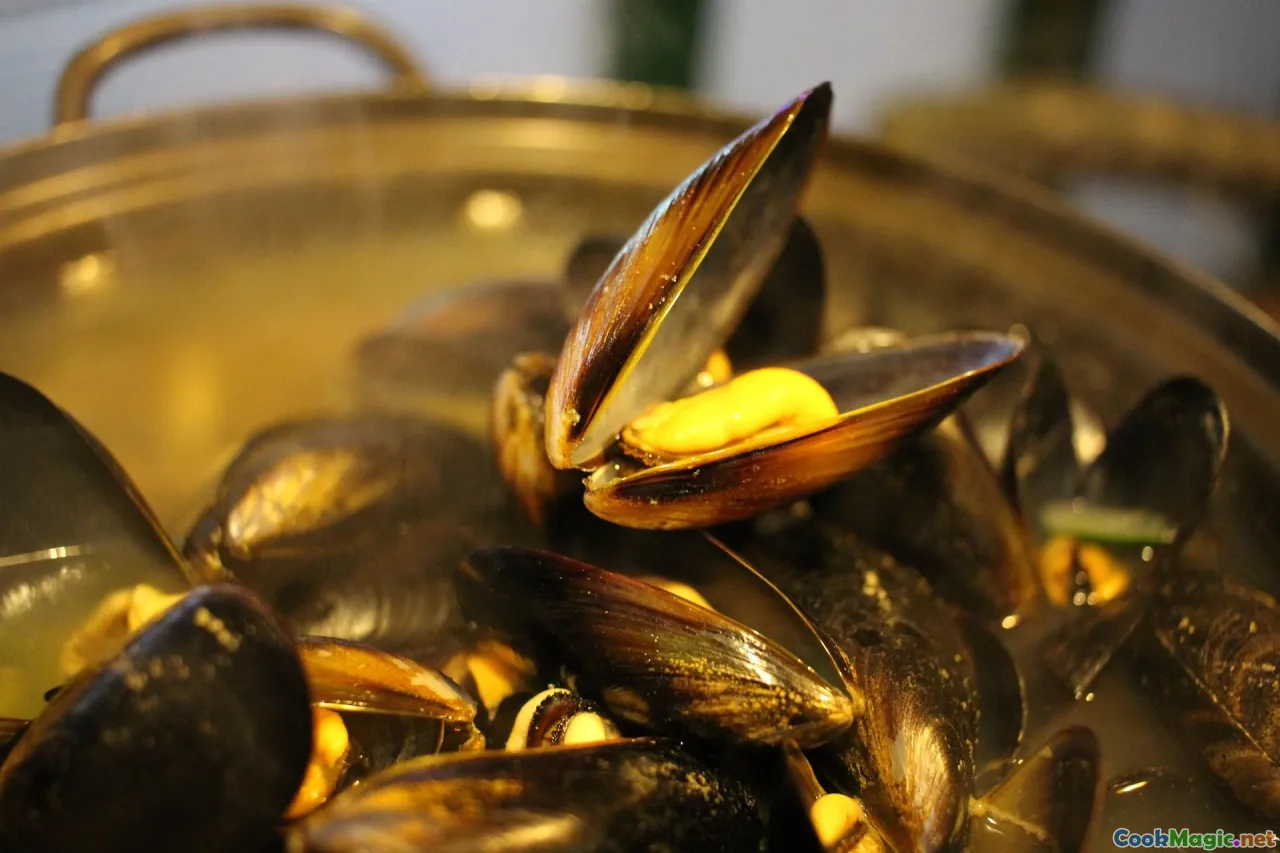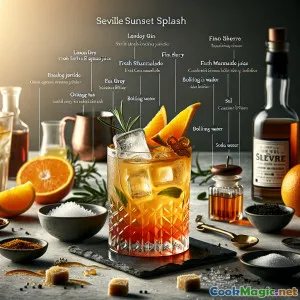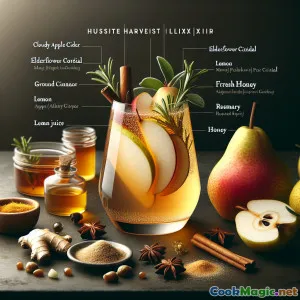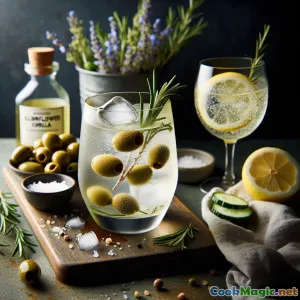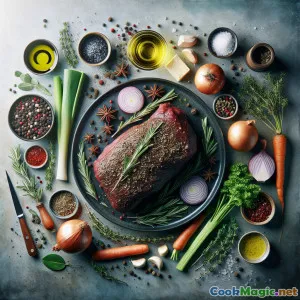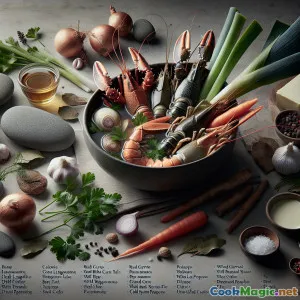
حساء قشرة الربيان القديم على الحجر الريفي
(Rustic Stone Aged Langoustine Shell Soup)
(0 المراجعات)0
3,014
أغسطس 16, 2025
الإبلاغ عن مشكلة
المكونات
-
500 grams قشور الكركند
(Shells from about 12 raw langoustines, heads included)
-
8 large ذيل اللامبسترين النيء
(Deviened, reserve for garnish)
-
1 stalk كرفس
(مفروم بشكل خشن)
-
1 medium جزرة
(Chopped; grill on outdoor fire for true flavor)
-
2 small الشالوت
(مقطع)
-
1 small الكُرَّاث
(تم تنظيفها وتقطيعها)
-
15 leaves ثوم بري (رامسونز)
(Replace with chives if unavailable)
-
1 small اللفت الأبيض
(Peeled and chopped, grilled if possible)
-
2 leaves أوراق الغار
(جاف أو طازج)
-
2 tbsp بقدونس أوراق مسطحة
(Roughly chopped, more for garnish)
-
1 tsp ملح البحر
(حسب الذوق)
-
1 tsp حبوب الفلفل الأسود الكاملة
-
1.3 litres ماء الينابيع البارد
-
200 ml سايدر جاف (الأسلوب الإنجليزي)
(For unique depth, or dry white wine)
-
80 ml كريمة طازجة
(Double (heavy) cream)
-
2 tbsp زبدة غير مملحة
(لطهي الخضروات المقلية)
-
1 medium حصى أو حجر نظيف
(Washed and boiled, for authenticity & serving ritual)
(Shells from about 12 raw langoustines, heads included)
(Deviened, reserve for garnish)
(مفروم بشكل خشن)
(Chopped; grill on outdoor fire for true flavor)
(مقطع)
(تم تنظيفها وتقطيعها)
(Replace with chives if unavailable)
(Peeled and chopped, grilled if possible)
(جاف أو طازج)
(Roughly chopped, more for garnish)
(حسب الذوق)
(For unique depth, or dry white wine)
(Double (heavy) cream)
(لطهي الخضروات المقلية)
(Washed and boiled, for authenticity & serving ritual)
التغذية
- الحصص: 4
- حجم الحصة: 1 وعاء (300 مل)
- Calories: 320 kcal
- Carbohydrates: 15 g
- Protein: 20 g
- Fat: 16 g
- Fiber: 3 g
- Sugar: 7 g
- Sodium: 810 mg
- Cholesterol: 145 mg
- Calcium: 120 mg
- Iron: 1.9 mg
التعليمات
-
1 - Prep Vegetables & Shells:
Scrub and dry all vegetables. Optionally char carrot and parsnip over open flame or grill for a smoky depth. Rinse langoustine shells thoroughly.
-
2 - Sauté Base:
Melt unsalted butter in a large, heavy-bottomed soup pot (or a cauldron). Add shallots, celery, and leek; sauté on medium until softened and aromatic, 5–6 min.
-
3 - Roast Langoustine Shells:
Turn up heat, add langoustine shells to vegetable base. Stir and roast till shells deepen color and emit sea aroma.
-
4 - Add Charred Veg & Herbs:
Stir in charred carrot and parsnip, wild garlic (or chives), bay leaves, and half the parsley. Fry until wild garlic softens, about 2–3 min.
-
5 - Deglaze & Simmer:
Pour in cider, scraping any browned bits. Let reduce by half. Add spring water, peppercorns, and salt.
-
6 - Slow Simmer & Extraction:
Bring to a boil, then simmer gently (uncovered) for 40 minutes. Occasional skimming helps clarify the broth.
-
7 - Strain & Refine:
Carefully strain soup through fine muslin or cheesecloth into a clean pot. Discard shells & vegetables. Return strained broth to gentle heat.
-
8 - Finish the Soup:
Stir in double cream and remaining parsley. Taste and adjust seasoning, simmer gently but do not boil.
-
9 - Prepare Pebble Ritual:
Boil the washed stone in a separate small saucepan for at least 5 mins. Just before serving, place the hot stone in the serving bowl (careful: it’s hot and for theater!).
-
10 - Poach Langoustines & Serve:
Gently poach the raw langoustine tails in the strained, gently simmering soup (60–90 seconds, until just cooked). Divide soup and tail medallions into warmed bowls, ladle soup over 'stone'. Garnish with wild herbs. Serve piping hot.
Scrub and dry all vegetables. Optionally char carrot and parsnip over open flame or grill for a smoky depth. Rinse langoustine shells thoroughly.
Melt unsalted butter in a large, heavy-bottomed soup pot (or a cauldron). Add shallots, celery, and leek; sauté on medium until softened and aromatic, 5–6 min.
Turn up heat, add langoustine shells to vegetable base. Stir and roast till shells deepen color and emit sea aroma.
Stir in charred carrot and parsnip, wild garlic (or chives), bay leaves, and half the parsley. Fry until wild garlic softens, about 2–3 min.
Pour in cider, scraping any browned bits. Let reduce by half. Add spring water, peppercorns, and salt.
Bring to a boil, then simmer gently (uncovered) for 40 minutes. Occasional skimming helps clarify the broth.
Carefully strain soup through fine muslin or cheesecloth into a clean pot. Discard shells & vegetables. Return strained broth to gentle heat.
Stir in double cream and remaining parsley. Taste and adjust seasoning, simmer gently but do not boil.
Boil the washed stone in a separate small saucepan for at least 5 mins. Just before serving, place the hot stone in the serving bowl (careful: it’s hot and for theater!).
Gently poach the raw langoustine tails in the strained, gently simmering soup (60–90 seconds, until just cooked). Divide soup and tail medallions into warmed bowls, ladle soup over 'stone'. Garnish with wild herbs. Serve piping hot.
المزيد عن : حساء قشرة الربيان القديم على الحجر الريفي
Stone Aged Langoustine Shell Soup: History, Tips & Modern Revival
Stone Aged Langoustine Shell Soup is a creative reinvention of an ancient, earthy way to enjoy shellfish: utilizing all parts of the catch—including the precious yet often discarded shells—mirroring the zero-waste ethos of the Stone Age while delivering complex, layered flavors reminiscent of a foraged English coastline.
Historical Inspiration & Cultural Roots
Rooted in the rugged traditions of the British Isles (particularly Scotland and the North of England), shellfish gatherers have drawn upon land and sea for survival for millennia. Using open flames and simple foraged herbs, fishermen and coastal communities transformed humble shell leftovers and roots into comforting stews and broths. In celebration of those environments, this soup draws on familiar northern aromatics: leeks, wild garlic, and parsley, heightened by the deep, caramelized sweetness of grilled root vegetables and a trace of cider—a drink as historic as the soup itself.
The "stone age" element here acts as a tribute to early culinary rituals. Boiling or searing stones were sometimes used to impart heat into bowls or to add drama when entertaining guests—as well as symbolism for hearth and primal gatherings.
Unique Aspects of This Recipe
- Stone Age Ritual: Serving the soup over a thoroughly cleaned, boiled stone sparks conversation and visual intrigue; the heat keeps the soup hot and echoes ancestral techniques.
- Foraged Flavors: Wild garlic (ramsons) or British wild herbs take center stage. Their punch pairs beautifully with the briny sea.
- Langoustine Shells: Beyond sustainable kitchen practice, roasting the shells as a soup base yields immense umami—superior to many commercial fish stocks.
- Open Fire/Char: Charring carrots and parsnips injects both sweetness and a touch of smoke; essentially amplifying wilderness authenticity without fuss.
Tips & Notes
- Pebble Safety: Only use a well-washed, food-safe stone—granite or basalt is best. Make sure there are no cracks or organic growth, and boil it for at least 5 minutes to sanitize.
- Alcohol Swap: While cider layers in complexity, a squeeze of lemon juice and a touch of honey offer a non-alcoholic option.
- Vegetable Flexibility: Substitute or add other root veg (turnip, celeriac) for variety or if foraging/farming rules the day.
- Maximum Flavour: Allow plenty of simmer time, and always roast shells until almost caramelized for the richest base.
- Storage: Store strained soup (without langoustine tails) refrigerated for up to 2 days; reheat gently. Freeze stock for future decadence.
Cultural Significance
The recipe encapsulates several cultural themes: resourcefulness and reverence for the full ingredient, British wildcrafting, and communal rustic eating. British shellfish, particularly langoustines—'Dublin Bay prawns'—have become globally prized; yet, at British coasts, soup from offcuts is unwaveringly humble. Sharing this dish recalls coming together after harvest or gathering outings, keeping warmth and refined nourishment at the center of tradition and storytelling.
Personal Thoughts
Stone Aged Langoustine Shell Soup is rare in both substance and spirit. It's a dish built to impress—the table-side stone-drop is memorable!—but also one that transports you: the aroma of iodine-rich shells, wood smoke, and spring greens anchor you to rough shores and ancient firesides. A feast for both palate and soul, not least because it turns "waste" into luxury, rewards patience with depth, and delivers freshness impossible to bottle or box.
Finally, whether you have access to foraged ingredients or make a few pragmatic swaps, this recipe invites experimentation. Treasure the process—and maybe a wild story or two—as much as the result.

